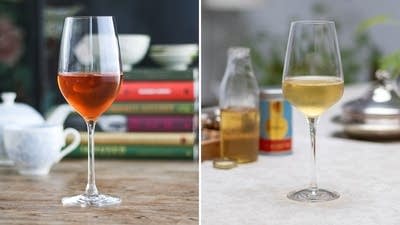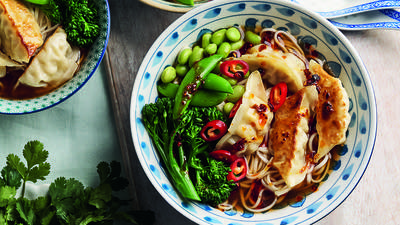
[This interview was conducted through an interpreter at the Minneapolis Institute of Art in October 2015.]
"If you go home and you eat an apple, is that cooking?" asks chef Ferran Adria of the El Bulli Foundation and the former El Bulli restaurant. His work is featured in the art exhibition "Notes on Creativity."
Jennifer Russell: Here we are in this gallery and this beautiful exhibition filled with your work. How do you want people to experience this? What do you want them to learn about you and your work?
Ferran Adria: What I want is for people to reflect on it, to think. People hardly ever reflect on the fact that things have been created in cuisine. Anything that we eat was at some point created. Everything does have that.
These pictures here? Those were for visualizing from the Big Bang to the Neolithic -- the whole evolution that there has been in food and cuisine. We can't really agree, or there would be certain doubt as far as deciding when is it that cooking starts.
 Chef Ferran Adria at the Minneapolis Institute of Art in October 2015.
Photo: Jenny Luebke
Chef Ferran Adria at the Minneapolis Institute of Art in October 2015.
Photo: Jenny Luebke
If you go home and you eat an apple, is that cooking? For me that's not because there's no aptitude as far as cooking goes. That might be gastronomy. Because if you want to eat it and enjoy it, make it pleasurable because it might be a really good apple, there might be some gastronomy aptitude there. But if you were to put that very same apple on a plate, for me that's cooking.
In that very fine line, right there, that's where we could say cooking really starts. Because cooking is transforming the food to make it more pleasurable. So when did cooking start? When did it really start? Was it 2.5 million years ago when the Homo habilis came? Or did it actually start a million years ago with fire? When did it really start?
When was it that we were able to cook mostly in a similar way as we cook nowadays? How could you boil? How could you fry? How could you stew?
Ceramic. Not very long ago -- 8,000 years ago. A technology, the one that you use to make these containers, it's very simple. But that's what changed the history of gastronomy just as much as fire did.
JR: You are known for transforming the world of food. But how do you define your food and your cooking?
FA: First of all, the most important part about El Bulli is that we have made people think in relation to cuisine and gastronomy. It's pretty clear that we're supposed to eat organic, natural food, right? So it's clear that an organic tomato is a super natural product, right?
That's a lie. This is objective. Something natural is something that's in nature, but that the human being has not touched. The natural tomato is up in the Andes. That one you cannot eat. It's super bad. Ninety-nine percent of the natural vegetables are not edible. The organic tomato is the least natural thing in the entire world because it has been made -- man has participated to make it a better product. That's what El Bulli did.
 Chef Ferran Adria at the Minneapolis Institute of Art in October 2015.
Photo: Jenny Luebke
Chef Ferran Adria at the Minneapolis Institute of Art in October 2015.
Photo: Jenny Luebke
JR: I have a question about El Bulli. People consider those meals amazing, their most memorable meals ever. The idea of having 20 to 40 courses -- what did you want your diners to come away with from that experience?
FA: First of all, El Bulli was probably the first restaurant in history that had people who hated it. Why? Because we took that experience to the limit. We cooked to open new paths and to make you reflect on things. You would spend an average of five hours sitting down at El Bulli, sometimes even six. But it wasn't just always eating all the time. Can you imagine spending six hours watching a movie or at a museum? Six hours with a very, very high level of concentration. This all made El Bulli a very strange thing.
We could spend another whole hour talking about strange things at El Bulli. Without context people might think, "These guys are crazy." But no, we were actually the most logical people that you could ever imagine.
And with the foundation we're following the same path now. The whole thing is about asking ourselves, "Why, why and why?"
JR: You did not dream of becoming a chef. You didn't particularly love to cook or love to eat. Here you are. Your brother is a brilliant chef as well. How did you get here?
FA: It just happened. But it's a great reflection. The fact that it happened to my brother, Albert -- that's amazing, too.
There are probably very, very few people that in their discipline have had such a strange career. Normally you start in one discipline and you work really hard so you can go really far. We didn't. We started cooking thinking that we would last a year. Maybe that's why we always ask ourselves "why?" about things. But it is true that even I'm not able to answer this question.

Marta Mendez, Pictograms, 2001/2013, archival pigment print on Hannemuhle paper, fifteen prints, each: 12 x 12 inches, courtesy of elBullifoundation

Albert Adrià, Ferran Adrià, and Oriol Castro, from Notebooks Related to Creativity, 1987-2011, ink on paper, courtesy of elBullifoundation

Ferran Adrià, Theory of Culinary Evolution, 2013, crayon, paint stick and colored pencil, sixty drawings, each: 11 11/16 x 8 1/4 inches, courtesy of elBullifoundation

Ferran Adrià, Theory of Culinary Evolution, 2013, crayon, paint stick and colored pencil, sixty drawings, each: 11 11/16 x 8 1/4 inches, courtesy of elBullifoundation

Ferran Adrià, Plating Diagram, ca. 2000-2004, colored pen on graph paper, courtesy of elBullifoundation

Francesc Guillamet and Bob Noto, Interior of elBulli Kitchen, 2005–2011, four archival photographs, dimensions variable, courtesy of elBullifoundation

Still from 1846, 2013, digital film, duration: 1 hour, 27 minutes, produced by The Drawing Center, elBullirestaurant, and Mogollon, courtesy of elBullifoundation

Working Board N° 10: The Creative Methods, n.d., inkjet print on cork board, overall dimensions: 6 x 4 feet, courtesy of elBullifoundation

Luki Huber, Draining Spoon, 2003, notebook and spoon prototypes, 8 3/4 x 12 7/8 x 1 1/8 inches, courtesy of elBullifoundation

Albert Adrià, Ferran Adrià, and Oriol Castro, Notebooks Related to Creativity, 1987–2011, ink and graphite on paper, dimensions variable, courtesy of elBullifoundation
Before you go...
Each week, The Splendid Table brings you stories that expand your world view, inspire you to try something new, and show how food connects us all. We rely on your generous support. For as little as $5 a month, you can have a lasting impact on The Splendid Table. And, when you donate, you’ll join a community of like-minded individuals who love good food, good conversation, and kitchen companionship. Show your love for The Splendid Table with a gift today.
Thank you for your support.
Donate today for as little as $5.00 a month. Your gift only takes a few minutes and has a lasting impact on The Splendid Table and you'll be welcomed into The Splendid Table Co-op.




